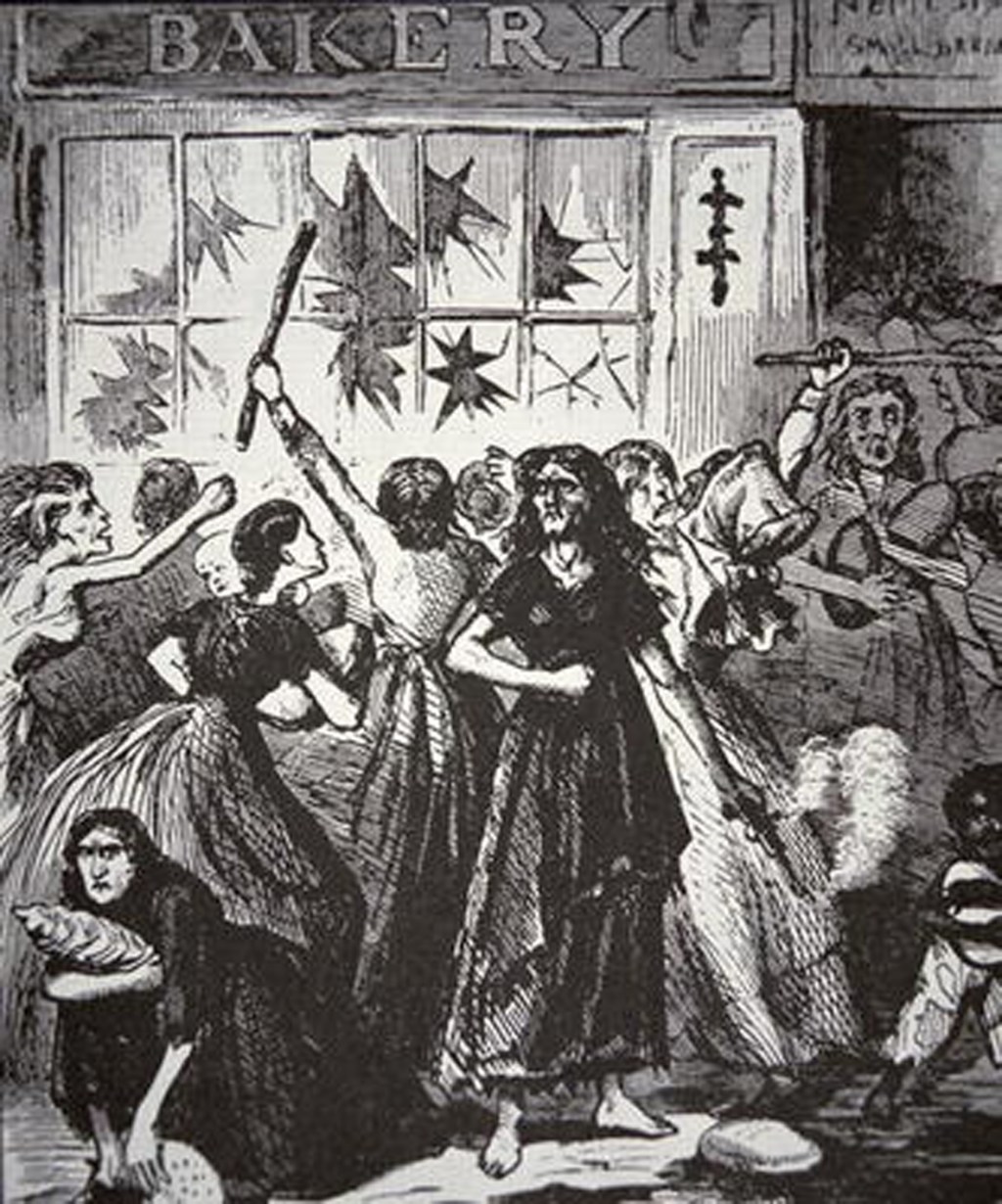“Yesterday some bread riots took place in Whitechapel and the mob did a considerable deal of damage to the workhouse…”
There’s this idea that we have progressed from mid-Victorian times, and in many ways this is true. You know, like in gender equality, the NHS, not jailing people for being gay or hanging them for nicking a pint of milk, and trying not to electrocute each other…
And some other stuff. Much of it the result of long social struggles.
However, in some ways, we have regressed since the mid-19th century. De-evolved.
One example of this is the modern unwillingness to riot when faced with extreme provocation. When rational reaction would in fact be to gather as a mob and take it out on some property, and fit a bit of wealth re-distribution while we’re at it.
This is where out ancestors were way ahead of us.
For centuries food riots were a regular feature of life. When poor harvests, shortages, recession or war caused the price of food, particularly staples like bread, to rise, 1000s of the poorest could not afford to feed themselves. Instead of taking this lying down, in many cases people rioted, seizing food they needed from the shops, markets or food transports. A certain ‘moral economy’ operated, so that on many occasions, the crowd would not merely loot food, but would force shopkeepers to sell at the usual lower price.
Other times mobs would just take it without paying.
A poor harvest in 1853, followed by the outbreak of the Crimean War in 1854, fuelled steep price rises in Britain, and heralded a period of sharply rising expenditure. The total number of ‘outdoor’ paupers in Middlesex, for instance, rose by nearly 40 per cent, from 33,869 in 1853, to 47,097 in 1855. London’s riverside districts registered the harshest poverty. The winter of 1854-55 was very severe, and the Thames froze over in February, stopping all work in the docks and river work.
A report in Reynolds Newspaper noted that “there are fewer than 50,000 men out of employ, who have been for several days past subsisting on the scanty relief doled out by the parishes and unions.”
“Tens of thousands of the poor are deprived of employment by the severity of the weather, especially in all vocations connected with the river.”
In early February the St George-in-the-East Workhouse ran out of bread… “Measures have been taken by the Guardians and Police Magistrates to supply the destitute at least with food ; but the number of applicants was so great that the officers could not relieve them fast enough.”
A few days later, as the Whitechapel Workhouse refused to give out any relief, a crowd built up, and ransacked food shops in the area. Bakers’ and chandlers’ shops were plundered of bread and coal. Food riots spread to other parts of the East End, and to Bermondsey in South London.. Meanwhile other parts of the country were also rioting, especially in Liverpool.
“Mobs collected, under the leadership, for the most part, of stalwart and turbulent Irishmen; who, loudly demanding ” bread,” paraded the streets, and pillaged the shops, not only of food but of money. In this alarming state of things, most of the shops were shut ; and a kind of terror prevailed from ‘White- chapel to Hackney. The Police, however, regardless of numbers, rushed upon the ringleaders and arrested many. All day on Thursday, the Magistrates in Stepney, Worship Street, ‘and Southwark—for there was some rioting in Bermondsey—were engaged in dealing with the fellows under arrest, and several were committed for trial. They also received deputations from the inhabitants asking for protection, begging that special constables might be sworn in. The Thames Police Magistrate declined to grant the latter request; but Superintendent Howie was present, and assured the applicants that he had a large and increasing force at his disposal, and that he would be able to maintain order. It was evident that the example of Liverpool had not been without effect, for it was spoken of with zest by the rioters.”
Extra police were drafted in, and some rioters were lifted, and sentenced to 6 months hard labour. Luckily for the authorities a sudden thaw eased conditions on the river, and the riots subsided as fast as they’d arisen…
But the vast overwhelming poverty of many residents of the East End and other parts of London remained a looming menace for the authorities. Dockers marched to the Whitechapel Workhouse in March 1855 demanding bread. Food rioting would break out again in East London and Clerkenwell in 1857, 1861 and 1866… and in Deptford in 1867.
Today the ratcheting divide between rich and poor is increasing pressure again. 1000s cannot afford to feed themselves. Food banks are all very well. But perhaps its time for some backward evolution. Can we rebuild a sense of our own ‘moral economy’ – and start taking back the products of our labour… from those who steal it from us?
@@@@@@@@@@@@@@@@@@@@@@@@@@@@@@@
An entry in the
2017 London Rebel History Calendar – check it out online.

Leave a comment